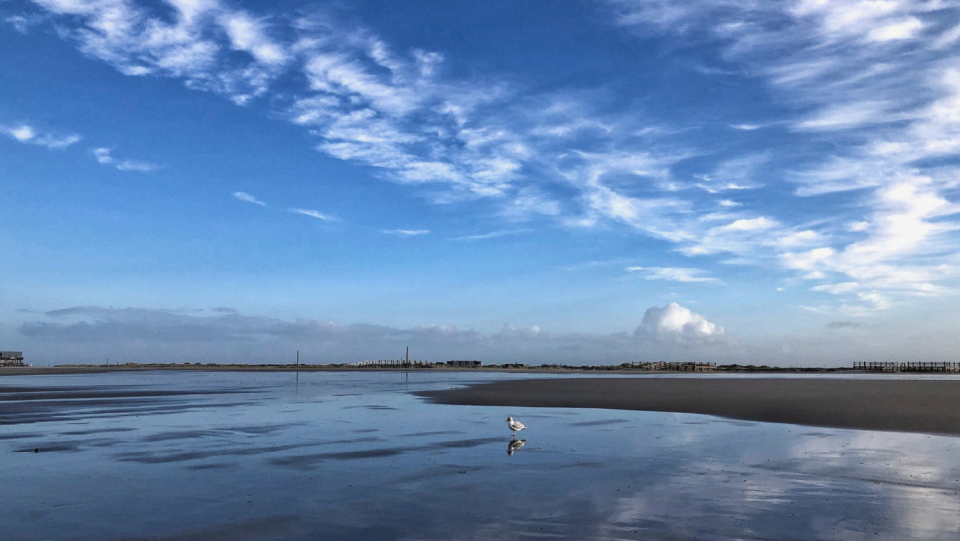A gentle breeze, the rushing of the waves, the glitter of the sun on a ripening surface - the stay on or in the water has a bit deeply relaxing. You already knew that in Victorian England: doctors prescribed sea air against melancholy. The French have sent sick people to natural sources for centuries. Now science has also discovered the healing power of water.
How well a stay in nature is doing is more aware of today than ever. Hundreds of studies underpin the positive effects. The findings flow into health policy measures and renovation projects that people want to lure more outside. Because that should counteract the health problems that modern life brings.
However, it is worth taking a closer look at the current studies before falling into the wilderness to increase physical and mental well -being. Because if you try to spend as much time as possible in the countryside, you may not be up to date: New research results show that places on the water may be able to offer us even more.
Off into the countryside
It is considered to be well documented that the nature of the human psyche is good. The Japanese practice of Shinrin-Yoku, better known as "Waldbaden", which was established in the 1980s, is a proven tradition to connect with all senses to the outside world. Studies attested her a calming effect on the heart rate, and the forest bathing also lowers the level of stress hormones and blood pressure.
In addition, people who live in greener areas tend to be psychologically healthier – but how exactly is the connection? Do you really owe this to nature or maybe for other reasons? A team led by Mathew White from the British University of Exeter wanted to find out exactly that. To this end, the researchers examined the data of more than 1000 people who had moved within England in 2013. The result: people who had moved to greener city districts were much better mentally afterwards. This directly confirmed for the first time that green spaces can make people happier.
In the meantime, there is indications that a visit to nature does not only affect well -being. We also become more attentive, creative, can better remember things - the list is long. Some people can sleep better, better deal with anxiety or depression. Symptoms of diseases such as ADHD can also be relieved in this way. These findings are slowly arriving in practice: local politicians provide more green spaces in the cities, in some countries doctors even prescribe their patients stays in nature.
But we may be missing something if we focus only on the green healing power. About ten years ago, the idea first came up that places on the water could be even better than those in the countryside. Susana Mourato of the London School of Economics and George Mackerron of the University of Sussex decided to get to the bottom of this. They asked more than 20,000 people in the UK to use a smartphone app that sent them a questionnaire at random times. How do you feel? They had to answer questions like these on the spot.
Blue is even better than green
The research group collected more than a million answers. Based on the location data of the phones, she determined that people in nature were much happier than those in the city. Even if it took into account factors such as the day of the week or the weather, the context remained. But: The researchers are the happiest on marine and coastal areas by far the happiest.
Coastal areas scored about six points better than urban districts on a 100-point happiness scale. According to the researchers, this difference is similar to that between the feeling of happiness when visiting an exhibition and that when doing housework. Other natural areas, including mountains, heathland and even freshwater, fared significantly worse: they received only about two to three points more than urban areas.
In recent years, more and more research projects have dealt with the effects of different places on the water. One of them is the Bluhealth project, on which scientists from all over Europe work, including White. His team found that places on the water in comparison are better for our physical and mental well -being. According to the results, the very best is where there are both.
The effect of nature is – compared to factors that influence well-being, such as a good job, a harmonious marriage or happy children – only a drop in the ocean, says White. Still, his research has found that living in green environments can offset some inequalities in mental health stemming from socioeconomic differences. One sometimes hears the accusation that research on green spaces has so far focused primarily on the middle class. But two large, recent studies have shown that low-income people living by the sea are, on average, physically and mentally healthier than one would expect given their other circumstances. Unemployment, for example, is considered one of the main factors for low well-being.
The fact that we find being in nature so invigorating makes perfect sense when we look into our past. In the early 1980s, biologist Edward O. Wilson put forward his famous biophilia hypothesis. It says that our brain is programmed to seek a connection to nature, because we have evolved from it. Even if it is very different from the environment in which most of us live today.
Why water makes so happy
The so-called Attention Restoration Theory (german: theory of the restoration of attention) could also explain the effects. It states that a stay in nature restores the ability to concentrate. To understand this, one must deal with the nature of our attention: Basically, there are two types of attention, the involuntary and the directed or voluntary. In the former, we are captivated by an interesting or unexpected stimulus (for example, an intimate conversation of a couple sitting at the table behind us in the café), while in the latter, we have to actively focus on something (the book, for example, we were about to read before we started listening). This type of attention requires what psychologists call top-down control. This means that thoughts control actions. Bottom-up, on the other hand, means that sensory information influences what we think.
With directed attention, we have to hide distractions – this is mentally very exhausting. This is where nature comes into play. It is full of stimuli that attract our attention according to the bottom-up principle. This gives the mind a breather. Perhaps you have ever felt invigorated after watching a magnificent sunset or looking at trees gently swaying in the wind. This could be due to the fact that this sight interrupted the ongoing top-down processes and gave them some rest.
Such a thought helps to explain why places on the water are apparently better than other natural spaces. They have a diverse pattern of changes, especially on the coast. The tides change, the waves hit the beach, the sun glitters on the horizon. In addition, the sound and even the light changes. All of these environmental changes have a calming effect and create what researchers call gentle fascination. It directs our attention away from certain thoughts - possibly even from the negative brooding that occurs frequently in depression, says White.
Studies have also shown that places by the water motivate us to do things that are not possible on green spaces: to play in the sand, to swim or to paddle, for example. Children often report that their parents have more time to play and engage with them at the seaside (see "Out with you, children"). Regardless of whether such a visit takes place with family or friends, the activities carried out there seem to generate strong, positive social experiences. This quality time has a positive effect on mood and well-being. This led White and his colleagues to the idea of investigating whether mental health benefits in adulthood if you often spent time at the water as a child. However, the results of the study are not yet available.
Another possible, albeit controversial explanation for the advantage of places on the water, goes back to our evolutionary past. Most evolutionary biologists assume that people split off from the family tree of other monkeys when they left the forest and went into the savannah. In 1960, the biologist Alister Hardy opposed the thesis that our human ancestors moved to the coast and adapted to the living space there. This water theme hypothesis could explain a lot-for example, why we can swim unusually well. Why our body is largely hairless - and even why we go on two legs. After all, we have to keep our heads over water. A pretty strong argument for standing and going up.
There is ample evidence that our ancestors spent time in and around the water, White says. Some of the earliest human settlements were littered with discarded conch shells. This suggests that our ancestors ate a high-protein diet. This may have driven the development of the brain. This does not necessarily result in a preference for beach holidays. But: We have a certain evolutionarily rooted connection to water.
Out with you, children
All parents of small children have probably already felt the overwhelming urge to go into nature with them. The calming effect is almost magical - even if it is just a short walk in the local park. Probably there is more than the need to let steam.
A stay in nature can make a huge difference to children: they have better school grades and better mood, they can concentrate more easily, even if they are affected by attention deficit hyperactivity disorder. Those who spent a lot of time in nature as a child may be more environmentally conscious in adulthood. Access to urban green spaces can influence children's social networks and friendships, and even promote intercultural inclusion.
The sea can also work wonders. Mathew White from the University of Exeter in the UK has studied children who were expelled from school or who were threatened with this because of behavioral problems. They took part in a surfing program. White found that the children not only got fitter, but also developed a more positive attitude towards school and friendships. They also got a more positive body image. Especially in the early teens, well-being largely depends on this.
If you are lucky enough to live near a water or to spend your well -deserved vacation there, you can do something to pull even more benefits from it (see "how to optimally use your time in nature"). Research by White and his colleagues have shown that it is not the pure closeness to nature or the duration of the stay, but whether someone feels connected to it. Instead of drinking in the Piña Colada deck chair, you should rather actively interact with nature, for example take photos, watch or swim birds.
City dwellers can also reap the benefits of water. Studies have shown that some effects are already conveyed by nature photos or documentaries. They create a positive mood and drive away boredom. Further research has shown that virtual reality (VR) can convey the positive effects of nature – perhaps because it triggers a similar feeling of connectedness. One study found that people who had a tooth extracted felt less pain, anxiety and stress when they took a virtual walk on the beach while doing so. Even when visiting the dentist again, they felt much more comfortable than those who had taken a virtual walk through a city or had no VR experience.
So in all the efforts we are making to make our cities greener, we should also try to make them "bluer". The doctors who are already prescribing stays in nature should perhaps be guided by their Victorian colleagues and also issue "blue" prescriptions. For those who like to spend time on the water anyway, there is now a scientifically recognized reason to log off at work, go to the sea or the lake and soak up the beneficial effect.
How to make optimal use of your time in nature
1. Take time
According to a study with almost 20,000 people, the health benefits from a length of stay of about two hours a week are in nature. The longer, the better - this applies up to a period of about five hours. Then a plateau seems to be reached.
2. Shorter stays also count
It doesn't matter whether you spend a lot of time in nature at a time or spread out in small sections over the week. A study showed that the individual stays should last at least ten minutes.
3. Mail a connection
A stay in nature brings the most when you feel connected to it. Find your way to engage with it: maybe you like gardening, photographing the landscape at different times of the year, or watching birds and wildlife.
4. Go out in winter
Studies show that mental health benefits from nature not only in summer, but also in winter. That's when many of us need it most. At best, you keep the connection going throughout the year.
5. Do not force
Research has shown that people with depression and anxiety are doing better when they spend time in nature - but it must be their decision. If people felt under pressure to visit nature, they were less happy and were more afraid of the next trip. This means that recipes for stays in nature that some doctors issue can be counterproductive. Take care of nature in your own way and do not urge others to do the same.
6. Quality over quantity
The quality of green spaces seems to be more important than their size. There are two main features that reduce stress: rooms that serve as a safe haven – surrounded by trees or hedges, for example – and those that feel particularly natural. Look for such places.



















